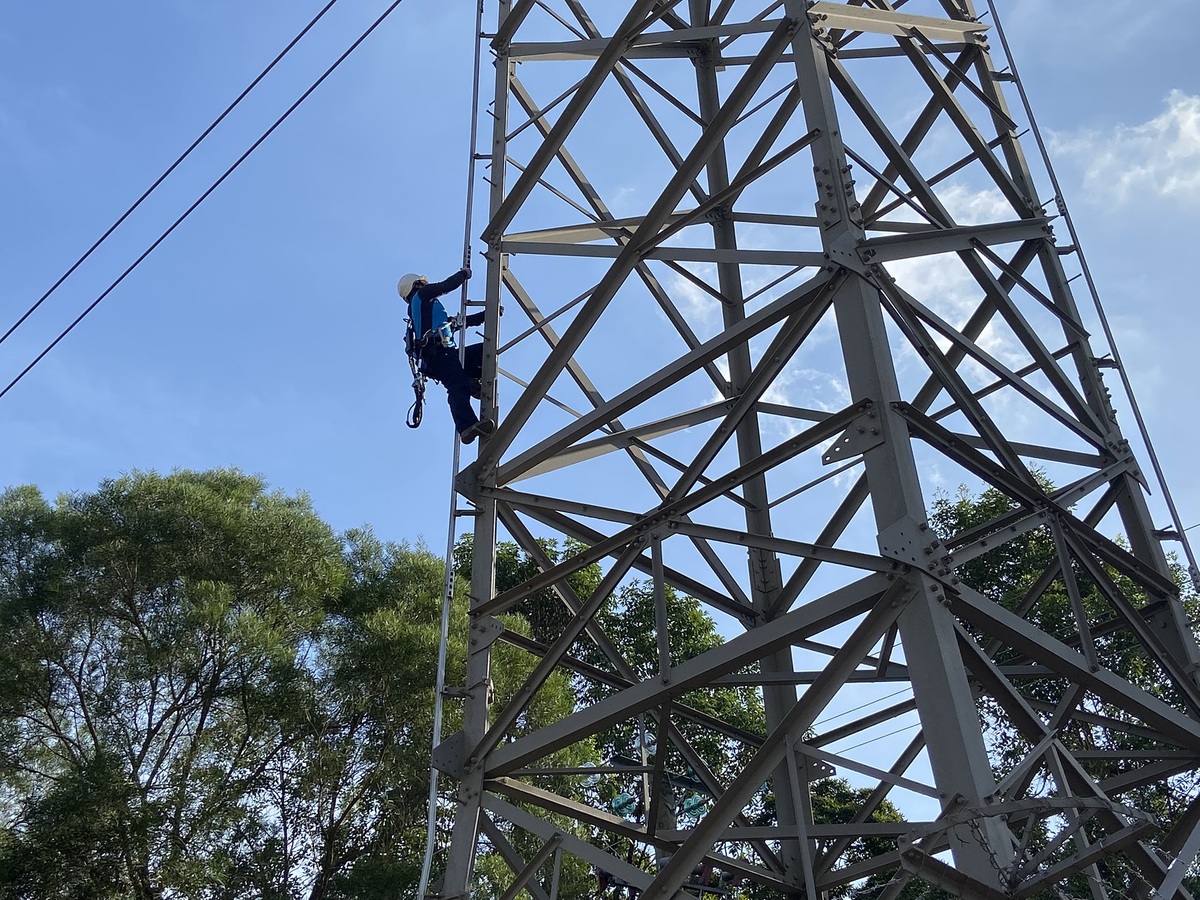
A technician shows how to climb a tower for working at heights in Hong Kong in October 2022. WEI HUADU/CHINA NEWS SERVICE
Hong Kong is planning to strengthen its electricity interconnection with the mainland through a new infrastructure project, Wong Shuk-han, undersecretary for environment and ecology in Hong Kong, told China Daily in a recent interview.
The project will increase the share of zero-carbon energy in Hong Kong's fuel mix for power generation in the long run, she said.
"We are planning ahead for the construction of new infrastructure for receiving and processing electricity transmitted to the Hong Kong Special Administrative Region from other regions, with land reserved for building the project, namely Electricity Facilities in our city."
The Electricity Facilities are strategic to enhancing regional energy cooperation, and will be connected to the electricity supply systems of the two local power companies in the future.
The facilities are expected to be commissioned by 2035, and the share of zero-carbon energy imported from the mainland in the HKSAR's fuel mix for electricity generation may further increase to around 60 percent to 70 percent by then, she added.
The HKSAR is also stepping up efforts to improve the current mainland-to-Hong Kong power interconnection project.
"Upon completion of the enhancement of the current pipeline project — Clean Energy Transmission System — connecting the Daya Bay Nuclear Power Station and Hong Kong in 2025, its transmission capacity will be increased with greater flexibility to import more clean energy from the mainland, and the share of electricity imported from the mainland in our fuel mix for electricity generation could be increased from around 25 percent to 35 percent by 2025," she said.
Wong said collaboration between Hong Kong and the mainland in the energy sector will yield win-win results.
"The HKSAR cannot produce enough zero-carbon energy to meet the electricity demand of a population of 7.5 million on its own. To move further away from reliance on fossil fuels for electricity generation, the HKSAR must explore various measures including strengthening collaboration with the Guangdong-Hong Kong-Macao Greater Bay Area, thereby developing a diversified fuel mix to increase the use of zero-carbon energy," she said.
Talking about the HKSAR's role in bridging the mainland's and the world's carbon markets, Wong said the Hong Kong Exchanges and Clearing Ltd launched an international voluntary carbon market, Core Climate, in 2022.
"Core Climate serves as a convergence point for capital and climate-related products from the HKSAR, the mainland and beyond. It is also the world's only carbon market to offer Hong Kong dollar and RMB settlement for trading of international voluntary carbon credits, and is poised to contribute significantly to the advancement of sustainable practices," Wong said.
She said the HKSAR is on track to becoming an international center for green technology and finance, enhancing the development of green finance and fostering exchange and cooperation with other markets.
"Going forward, with the rapid development of top-notch green products, advanced technologies and technical expertise on the mainland, we could leverage our unique position and distinctive edge to play a pivotal role in stepping up efforts to promote new energy and green transport," she said.
"We will also further promote the development of green and low-carbon hydrogen energy by supporting the industry to establish a solar-to-hydrogen facility for demonstration, introduce a bill in 2025 to ensure the safe use of hydrogen fuel, and formulate the approach of hydrogen standard certificate suitable to our local circumstances in due course," she added.
Wong said the HKSAR will take measures to support the taxi trade and franchised bus companies to purchase electric vehicles, and encourage the installation of fast-charging facilities. The target is to have a total of 3,000 fast chargers installed by 2030.
"We will also set a target for sustainable aviation fuel consumption and develop SAF and green maritime fuel supply chains to accelerate the industries' low carbon transition," she said.
Source: By Liu Yukun, chinadaily.com, Nov 21, 2024 [https://www.chinadaily.com.cn/a/202411/21/WS673e98f1a310f1265a1ceced.html]

